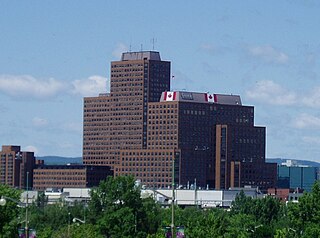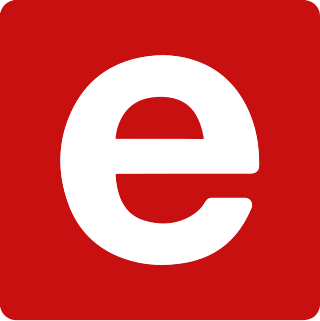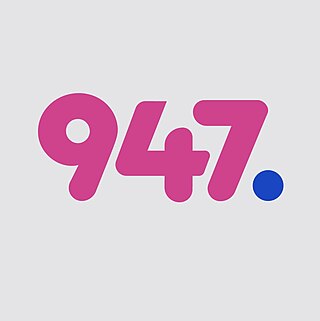Related Research Articles

The Canadian Radio-television and Telecommunications Commission is a public organization in Canada with mandate as a regulatory agency for broadcasting and telecommunications. It was created in 1976 when it took over responsibility for regulating telecommunication carriers. Prior to 1976, it was known as the Canadian Radio and Television Commission, which was established in 1968 by the Parliament of Canada to replace the Board of Broadcast Governors. Its headquarters is located in the Central Building of Les Terrasses de la Chaudière in Gatineau, Quebec.

The Independent Television Commission (ITC) licensed and regulated commercial television services in the United Kingdom between 1 January 1991 and 28 December 2003.

The National Association of Broadcasters (NAB) is a trade association and lobby group representing the interests of commercial and non-commercial over-the-air radio and television broadcasters in the United States. The NAB represents more than 8,300 terrestrial radio and television stations as well as broadcast networks.

The Office of Communications, commonly known as Ofcom, is the government-approved regulatory and competition authority for the broadcasting, telecommunications and postal industries of the United Kingdom.

e.tv is the first and only privately owned free-to-air television station in South Africa. It is the fifth terrestrial television channel in the country, following three channels that are operated by the state-owned South African Broadcasting Corporation and the privately owned subscription-funded M-Net. In 1997, the e.tv channel bought the broadcasting rights to broadcast English Premier League (EPL) matches and, later on, they also bought the rights to broadcast UEFA Champions League matches.

7de Laan is a South African Afrikaans soap opera created by Danie Odendaal and produced by Danie Odendaal Productions. The series focuses on the lives of residents staying in and around the community of 7de Laan, in the suburb of Hillside. The programme's dialogue is primarily in Afrikaans and is subtitled in English with some English and Zulu dialogue in between. The street and shopfronts which are featured on the opening visuals, are that of Seventh Street in Melville, Johannesburg.

947 is a radio station that broadcasts on the 94.7FM frequency from Johannesburg, Gauteng, South Africa.

The Jamiatul Ulama Transvaal now the Jamiatul Ulama South Africa, headquartered in Fordsburg, Johannesburg, was founded in 1923 to serve the Muslim community of the Transvaal Province of South Africa.

The Independent Communications Authority of South Africa (ICASA) is an independent regulatory body of the South African government, established in 2000 by the ICASA Act to regulate both the telecommunications and broadcasting sectors in the public interest.
Graham Fitch is an English pianist and piano teacher.

NZ On Air, formally the Broadcasting Commission, is an autonomous Crown entity and commission of the New Zealand Government responsible for funding support for broadcasting and creative works. The commission operates largely separate from government policy but must follow directions from the Minister of Broadcasting. NZOA is responsible for the funding of public broadcasting content across television, radio and other media platforms. It is also a major investor in New Zealand independent producers.

The Code of Practices for Television Broadcasters, also known as the Television Code, was a set of ethical standards adopted by the National Association of Broadcasters (NAB) of the United States for television programming from 1952 to 1983. The code was created to self-regulate the industry in hopes of avoiding a proposed government Advisory Board and satisfying parental concerns over violence and other matters. Prior to the Television Code, the 1935 NAB Code of Ethics for radio was applied to television but fewer than half of television stations subscribed to it; when the Television Code was first issued, two-thirds of stations became subscribers.

The Advertising Standards Authority (ASA) is the self-regulatory organisation of the advertising industry in the United Kingdom. The ASA is a non-statutory organisation and so cannot interpret or enforce legislation. However, its code of advertising practice broadly reflects legislation in many instances. The ASA is not funded by the British government, but by a levy on the advertising industry.
Chapter Nine Institutions refer to a group of organisations established in terms of Chapter 9 of the South African Constitution to guard democracy. The institutions are:

The mass media in Ghana, includes television, radio, internet publishing and newspapers.

Raidió Teilifís Éireann (RTÉ) is the public broadcaster of the Republic of Ireland. It both produces and broadcasts programmes on television, radio and online. The radio service began on 1 January 1926, while regular television broadcasts began on 31 December 1961, making it one of the oldest continuously operating public service broadcasters in the world. RTÉ also publishes a weekly listings and lifestyle magazine, the RTÉ Guide.

The Broadcasting Authority of Ireland (BAI) is a former broadcasting authority which regulated both public and commercial broadcasting sector in Ireland.
Gareth Rhydal Cliff is a South African radio and television personality. He began his professional radio career at 702, and later became the host of the breakfast show on 5FM. During his career at 5FM, his show included a feature called The Hollywood Report with Jen Su.
Bongi Ndaba is a South African producer and writer for television, as well as an actress and playwright.
In South Africa the Department of Public Enterprises is the shareholder representative of the South African Government with oversight responsibility for state-owned enterprises in key sectors. Some companies are not directly controlled by the Department of Public Enterprises, but by various other departments. Further, not all state owned entities are registered as companies.
References
- ↑ "BCCSA Constitution". Broadcasting Complaints Commission of South Africa. Retrieved 21 December 2011.
- ↑ "About the BCCSA". Broadcasting Complaints Commission of South Africa. Retrieved 21 December 2011.